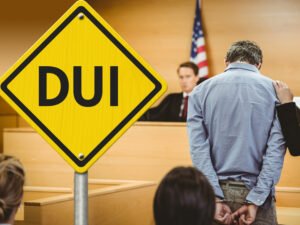
The DUI arraignment is the court hearing where you learn which crimes you are being accused of committing. It is also where you make your initial plea. The judge will decide whether to release you before trial or set bail. If you skip your arraignment, a bench warrant will be issued for your arrest.
| Stage in the DUI process | What happens |
| DUI arraignment | · The judge will read the charges being filed against you
· You make your initial plea · Pre-trial confinement is determined |
When the DUI arraignment hearing happens
If you are in confinement, then the DUI arraignment will happen a few days after you were arrested for drunk or drugged driving. If you were released, it can occur weeks or even months after the arrest.
The criminal defense lawyers at our law firm have found that you are far more likely to be held in confinement if you were arrested for a serious DUI offense like:
- vehicular manslaughter,
- gross vehicular manslaughter while intoxicated, or
- DUI with an injury.
The arraignment is the first court date in the criminal DUI process. The process typically goes through the following steps:
- you are pulled over on suspicion of driving under the influence (DUI),
- the officer gathers evidence that you are under the influence, such as by administering field sobriety tests or a breathalyzer,
- if the officer thinks that there is probable cause to believe that you are under the influence, you will be arrested and brought to the police station,
- at the police station, you will perform a breath test or, if police suspect that you are under the influence of drugs, a urine or blood test,
- you will be held overnight in jail, and
- you will typically be released from jail after posting bail or on a promise to appear at the scheduled arraignment.
If you are released, the DUI arraignment may be scheduled for several weeks in the future. If you are not released, it will happen within a couple of days.
During that time, the arresting police officer will complete their report of the incident. This police report will go to the local district attorney’s office. A prosecutor there will decide whether to charge you for DUI and which charges to file.
You are required to make a court appearance at the arraignment. If you do not appear, the judge will issue a bench warrant. When police next find you, you will be arrested. You will still face charges for the DUI, but may also now be charged with the crime of failure to appear.
What happens during the hearing
The DUI arraignment, also known as the initial hearing, is short. It usually only takes a few minutes. During it, the following things will happen:
- the judge will read the precise charges that you are facing,
- the judge will inform you of your constitutional rights, such as the ones to have a court-appointed attorney or public defender if you cannot afford a lawyer and your protections from self-incrimination,
- you will enter your initial plea of “not guilty,”
- the prosecutor will turn over “discovery,” or the evidence that they have obtained in your drunk driving case, usually including the blood alcohol content (BAC) test results, and
- the judge will set a date for the first pretrial conference, typically for a couple of weeks in the future.
The DUI-defense lawyers at our law firm typically waive your right to have your charges read aloud by the judge. The charges will be listed elsewhere. Having them read out loud just takes time. We also usually enter a plea of not guilty at the arraignment. You can change this to a guilty plea or a no contest plea later on. On the other hand, retracting a guilty plea after making one at the arraignment is very difficult to do.
If you are still in custody at the time of the arraignment, then a bail amount will be set or the judge will release you on your own recognizance (O.R.). You will usually be released on O.R. unless the criminal charges are severe, particularly if this was a first-time DUI offense. An O.R. release means that you promise to appear at your future court dates and do not post bail.
How it fits in the rest of the DUI process
The arraignment is early in the DUI court process. After the arraignment, there will be:
- investigations performed by law enforcement and by your DUI defense attorney,
- the pretrial conference, where plea bargains are discussed,
- relevant pre-trial motions filed by your defense team, such as those to suppress evidence and a “Pitchess” motion to examine the arresting officer’s past conduct,
- more plea negotiations, and
- if no plea deal was reached, the jury trial, which will end either with a DUI conviction or an acquittal.
Note that this is the criminal DUI process. There is also the administrative one. The administrative one is more expedited and only handles issues related to your driver’s license suspension.
Many DUI cases end with a plea deal
The vast majority of all criminal cases, including those for DUI charges, end in a plea deal. Very few actually go to trial.
According to statistics by the Administrative Office of the U.S. Courts:
91.4 percent of people charged with a federal offence in 2022 were convicted, with 89.5 percent pleading guilty and 1.9 percent getting convicted at trial.[1]
The criminal defense and DUI lawyers at our law office know that every case is unique. Your interests and priorities can drastically alter the best legal defense strategy for your situation.
Legal Citations:
[1] John Gramlich, “Fewer than 1% of federal criminal defendants were acquitted in 2022,” Pew Research Center (June 14, 2023).

